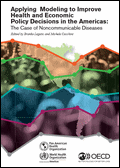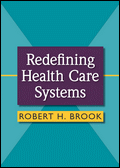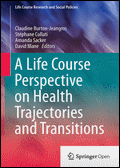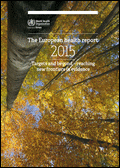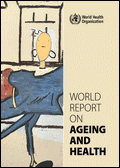 SELECTED FOR YOU... OCTOBER 2015
SELECTED FOR YOU... OCTOBER 2015
 books of the month
books of the month
 watch on health economics
watch on health economics
All the Selected for you
BOOKS
Applying Modeling to Improve Health and Economic Policy Decisions in the Americas.
Legetic B., Cecchini M.
Paris : OCDE, 2015/07
The book introduces several models for assessing health and economic policies in relation to NCDs; shows how the models can be used for different diseases or risk factors; and provides case studies of those models' application in various countries in the Americas. The ultimate goal is to help policymakers find the best strategies for costeffective and evidence-based NCD interventions.
Redefining Health Care.
Brook R.H.
Santa Monica : Rand Corporation, 2015
This book provides a scientific and personal perspective on health services research over the last half-century. Its purpose is to suggest how that science base, constructed over decades of sustained effort, can stimulate innovative thinking about ways to make health care systems safer, more efficient, more cost-effective, and more patientcentered even as they respond to the needs of diverse communities. The initial essay provides a perspective on the major achievements of health services research over five decades and argues that almost any reasonable health policy can work if the policy takes the relevant science into account.
A Life Course Perspective on Health Trajectories and Transitions.
Burton-Jeangros C. / éd., Cullati S. / éd., Sacker A. / éd., Blane D. / éd.
Berlin : Springer Verlag, 2015
This book examines health trajectories and health transitions at different stages of the life course, including childhood, adulthood and later life. It provides findings that assess the role of biological and social transitions on health status over time. The essays examine a wide range of health issues, including the consequences of military service on body mass index, childhood obesity and cardiovascular health, socio-economic inequalities in preventive health care use, depression and anxiety during the child rearing period, health trajectories and transitions in people with cystic fibrosis and oral health over the life course. The book addresses theoretical, empirical and methodological issues as well as examines different national contexts, which help to identify factors of vulnerability and potential resources that support resilience available for specific groups and/or populations. Health reflects the ability of individuals to adapt to their social environment. This book analyzes health as a dynamic experience. It examines how different aspects of individual health unfold over time as a result of aging but also in relation to changing socioeconomic conditions. It also offers readers potential insights into public policies that affect the health status of a population.
The European health report 2015. Targets and beyond – Reaching new frontiers in evidence.
Organisation Mondiale de la Santé. (O.M.S.). Bureau Régional de l'Europe. Copenhague. DNK
Danemark : Office des publications officielles du Bureau régional de l'Europe, 2015/09
The publication of the European health report every three years is an opportunity to focus on progress towards genuine health and well-being for all. The report gives a vital snapshot of health in the WHO European Region. It shows trends and progress towards the goals of Health 2020, the European health policy, and reveals some gaps in progress, inequalities and areas of concern and uncertainty, where action must be taken. The 2015 report shows that improvements in health continue throughout the European Region, and some of the inequalities in health between countries, notably in life expectancy and infant mortality, have decreased in recent years. In real terms, however, these differences still amount to 11 years of life and 20 healthy babies per 1000 live births between the best- and worst-performing countries. Absolute differences between countries remain unacceptably large, especially for indicators linked to social determinants of health. In addition, the report clearly shows that the European Region still has the highest rates of alcohol consumption and tobacco smoking in the world. The 2012 report introduced the concept of well-being within the Health 2020 framework, and the 2015 report continues the discussion. It: presents the first results on subjective and objective well-being in the context of Health 2020, and explores innovative ways policy-makers can address the challenge of measuring it; examines how culture may influence health and well-being; and looks at how WHO could use information from non-traditional sources – for example, drawing on history and anthropology – to gain a more complete picture of well-being in Europe. Health 2020 includes notions such as community resilience and a sense of belonging and empowerment, and requires fresh thinking about health information to ensure that the evidence collated meets the needs of the policy. The entirety of the information chain is fraught with challenges: from data collection to analysis, interpretation and reporting, and the use of information in policy-making. This report calls for broad international cooperation to focus attention and effort on harmonizing, setting standards for and creating evidence fit for use in the 21st century.
World Report on Aging and Health.
Organisation Mondiale de la Santé. (O.M.S.). Genève. CHE
Genève : OMS, 2015
Comprehensive public health action on population ageing is urgently needed. This will require fundamental shifts, not just in the things we do, but in how we think about ageing itself. The World report on ageing and health outlines a framework for action to foster Healthy Ageing built around the new concept of functional ability. This will require a transformation of health systems away from disease based curative models and towards the provision of older-person-centred and integrated care. It will require the development, sometimes from nothing, of comprehensive systems of long term care. It will require a coordinated response from many other sectors and multiple levels of government. And it will need to draw on better ways of measuring and monitoring the health and functioning of older populations. These actions are likely to be a sound investment in society's future. A future that gives older people the freedom to live lives that previous generations might never have imagined
